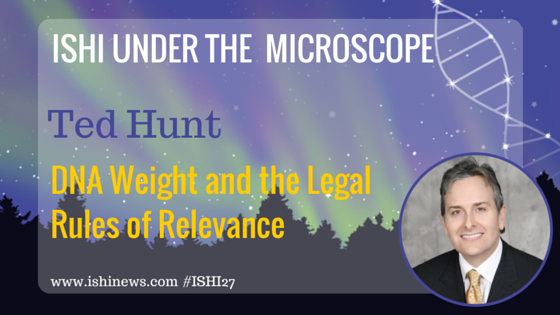The ISHI27 agenda is already filling up with some great talks from amazing speakers! While the forensic community is a tight-knit group, we can always get a little closer, right? With that in mind, we asked our speakers some questions to get to know them a little better outside of their work. We’ve been posting their responses in a feature we like to call Under the Microscope.
Today, we’re chatting with Ted Hunt, who will be presenting DNA Weight and the Legal Rules of Relevance during the General Sessions on Tuesday, September 27th.
Ted Hunt is currently the Chief Trial Attorney in the Jackson County (Kansas City) Missouri Prosecuting Attorney’s Office. He received his Juris Doctor (1992) degree from the University of Missouri-Kansas City School of Law. Ted has been a prosecuting attorney for nearly 25 years. In that time, he has prosecuted hundreds of felony jury trials, most involving the presentation of DNA and other types of forensic evidence. Ted is also involved in forensic science at the state and national levels, serving on a number of commissions, boards, and other projects designed to strengthen forensic science in the United States.
How did you come to work in the field of forensics/DNA?
It all started with a case. Right after our local lab began using RFLP technology, a visiting foreign professor who was teaching a local university was the victim of a brutal attack. A fingerprint hit and multiple DNA matches led to the defendant and ultimately cinched the case. After that, I was hooked and began to specialize in cases involving forensic DNA technologies.
What is your favorite thing about your job? Why?
As a prosecutor, you have both the opportunity and the obligation to simply do what is right, whether that means prosecuting a case or declining to file charges. That gives you a certain professional freedom that most attorneys will never enjoy.
What is the biggest challenge you face in your job?
Planning and preparation. Prosecuting cases is bit like herding cats. You need to first prepare and then assemble dozens of diverse people at the same time and place to tell their small part of a bigger story. Then there’s the personal preparation, legal research, motion work, jury instructions, and the trial advocacy aspects of each case. Done correctly, this job never fits cleanly within ‘the lines’ and working evenings and weekends is a common occurrence.
What accomplishment are you most proud of relating to forensics/DNA?
Using this amazing technology to help bring justice to countless victims over the last 20 years who had given up all hope that their cases would ever be solved. On occasion, I’ve also been able to utilize DNA results to decline or dismiss charges and to exonerate a wrongfully convicted inmate. It’s very gratifying to see the positive impact that forensic science can have on the lives of real people.
If you’ve attended ISHI before, what keeps you coming back? If you’ve never attended before, what are you most looking forward to at ISHI27?
Being around friends and colleagues who have the same interests and learning about the latest advancements, trends and research. There’s also a great party at the end of the week!
When you were little, what career did you think you’d have as an adult?
I always thought I would be a medical doctor while I was growing up. I had a strong interest in science, especially biology. Somehow I strayed off course and got interested in the law! So being involved in forensics has allowed me to stay in touch with my ‘inner scientist.’
Where do you see the future of forensic science headed?
An ever-increasing emphasis on automation, standardization, quantitative methods, and statistics in all aspects of forensics.
What do you hope the audience learns/takes away from your talk?
A better understanding of the granular level at which the law regulates (through the rules of relevance) the admission of weight-related expert testimony about DNA results for already-admitted (Frye/Daubert-satisfied) DNA technologies.
What person would you say has had the biggest influence in your career?
My father. He was a college basketball coach at some major universities across the country while I was growing up. He instilled the value of hard work in me and a competitive drive that continues to this day and has had a very positive impact on my career.
If you could time-travel, what year would you go to and why?
The Greco/Roman world in about the first century A.D. Relatively speaking, I’m amazed at how both technologically advanced and socially primitive the world was at that time in history.
Star Wars or Star Trek?
Definitely Star Wars (although I watched my fair share of Star Trek reruns growing up!). I was a kid living in Los Angeles when Star Wars premiered and was at one of its very first screenings on Hollywood Boulevard.
WOULD YOU LIKE TO SEE MORE ARTICLES LIKE THIS? SUBSCRIBE TO THE ISHI BLOG BELOW!


